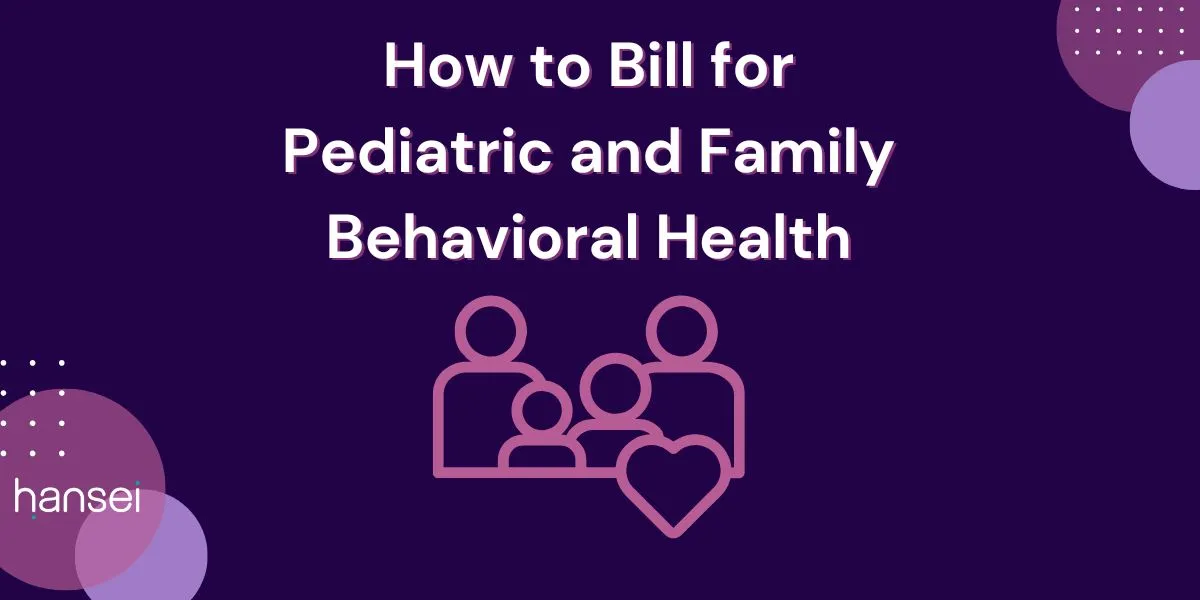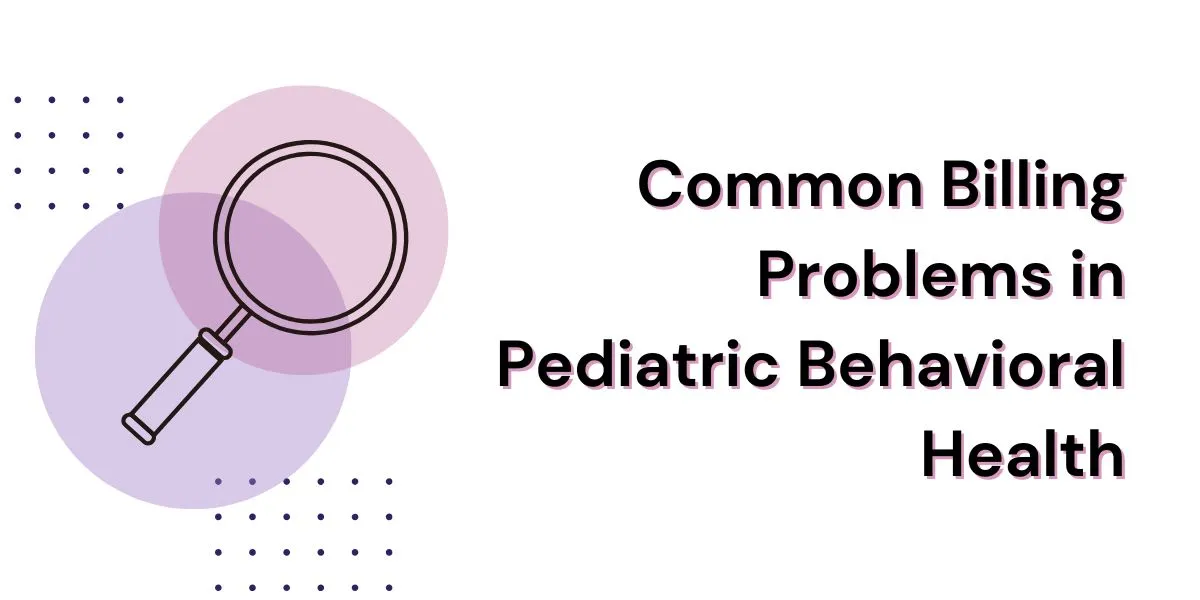Blog

Billing for pediatric and family behavioral health services can feel like a never ending maze. From decoding CPT codes to understanding payer-specific rules, the process requires both precision and constant vigilance. At Hansei Solutions, we’re committed to helping behavioral health providers optimize their billing processes, minimize denials, and keep revenue flowing smoothly. In this guide, we’ll break down the key considerations and strategies for billing pediatric and family behavioral health services effectively and compliantly.
Understanding Pediatric and Family Behavioral Health Billing
Pediatric and family behavioral health services include a wide range of interventions, such as therapy sessions for children and adolescents, family counseling, parent-focused sessions, group therapy designed for young clients, and psychological assessments. Unlike adult behavioral health, these services involve unique challenges due to developmental considerations and the essential role that families play in treatment outcomes.
Demand for pediatric behavioral health services has risen sharply in recent years. In the United States, about one in five children experiences a mental, emotional, or behavioral disorder each year, yet only 20% of those children receive care from a mental health specialist. This gap in care underscores the importance of properly billing and receiving reimbursement for the services providers deliver.
Navigating Age-Specific Codes and Documentation Requirements
One of the core challenges in pediatric behavioral health billing lies in selecting the correct CPT codes for each service type. Whether clinicians are providing individual therapy, family therapy with the child present, or family sessions without the child, the codes vary. For example, CPT code 90847 is used for family therapy when the child is present, while 90846 applies when the session involves only the parents or caregivers.
Psychological assessments and developmental evaluations are also a critical part of pediatric behavioral health, with codes such as 96130 through 96133 covering testing services. Proper documentation should always specify who attended the session, the primary therapeutic focus, the specific symptoms addressed, and the interventions applied. Clinicians must distinguish whether time was spent face-to-face with the patient or conducting analysis and coordination activities, as these differences significantly influence reimbursement eligibility.
Billing for Parent-Only Sessions
Parent-only sessions are integral to pediatric behavioral health care, allowing clinicians to discuss parenting strategies, provide psychoeducation, or coordinate complex care plans. However, billing for sessions without the child present can be challenging because not all insurance plans reimburse these services.
CPT code 90846 generally applies to family therapy without the patient present. But it’s important to remember that the presence of parents alone doesn’t guarantee reimbursement. The clinician must document how the discussion relates directly to the child’s diagnosis and therapeutic goals. A 2021 report by the American Psychological Association emphasizes the increasing recognition of family involvement in effective treatment for children, but payers still vary widely in how they reimburse for these services.

The Complexity of Care Coordination
Coordination of care is vital for successful pediatric behavioral health treatment, involving collaboration with pediatricians, teachers, school counselors, and other professionals. These efforts improve clinical outcomes and ensure the child’s environment supports therapeutic progress. Yet not all time spent in coordination activities is billable.
According to a study by the National Institute of Mental Health, integrated care models reduce hospitalizations and improve long-term outcomes for youth with mental health conditions. Despite the benefits, providers must document care coordination activities in detail, recording the purpose, participants, time spent, and the connection to the child’s treatment goals. Such meticulous records are essential for defending claims during audits and maintaining compliance.
Insurance Verification and Authorization Challenges
Pediatric behavioral health services often require rigorous prior authorizations, particularly for intensive treatments or long-term care. Many insurance plans impose limits on the number of sessions allowed per year or place caps on the total reimbursement for behavioral health services. Additionally, insurers frequently mandate periodic treatment reviews to justify continued care.
At Hansei Solutions, we recommend integrating robust verification protocols into the intake process to avoid costly denials or interruptions in care. Families deserve clarity about what services their plan covers and any potential out-of-pocket expenses. Proactive communication prevents frustration and protects the practice’s revenue.

Common Billing Problems in Pediatric Behavioral Health
Even seasoned providers can stumble when it comes to pediatric behavioral health billing. The unique nuances of working with children, families, and varied payer rules create many potential pitfalls that can jeopardize revenue and compliance. Understanding where practices often go wrong is the first step to avoiding costly mistakes.
Here are some of the most common billing errors we see:
- Billing parent-only sessions incorrectly – Submitting claims for parent-only sessions under individual therapy codes instead of family therapy codes often leads to denials or repayment demands during audits.
- Using adult-focused CPT codes for pediatric services – Applying adult therapy codes without confirming their validity for pediatric patients can trigger reimbursement issues and claim rejections.
- Neglecting to update authorizations – When treatment plans change but authorizations aren’t renewed, practices risk retroactive denials that can result in significant financial losses.
- Assuming telehealth coverage applies universally – While telehealth expanded rapidly during the COVID-19 pandemic, not all insurers cover pediatric behavioral health services delivered virtually, or they may impose unique documentation requirements.
These mistakes can have serious financial consequences. Each denied claim represents lost revenue and adds administrative burden. In the worst cases, persistent billing errors may raise red flags for payer audits.
Frequently Asked Questions (FAQs) About Family and Pediatric Billing
What code should I use for family therapy with the child present?
When the child participates in the session, the appropriate code is CPT 90847, which covers family psychotherapy with the patient present.
Can I bill for a session that involves only the parents?
Yes, in many cases, you can bill parent-only sessions using CPT 90846. However, always confirm with the payer, as not all insurers cover these sessions, and documentation must tie the session to the child’s treatment plan.
Are assessments and testing reimbursed separately from therapy sessions?
Absolutely. Psychological and developmental assessments often require separate codes, such as 96130 through 96133. Be sure to document time spent and the clinical justification for testing.
Does telehealth affect how I bill for pediatric behavioral health sessions?
Telehealth services can often be billed similarly to in-person sessions, but policies differ across insurers. Always check each payer’s requirements for telehealth coverage, including place-of-service codes and eligible services.
What’s the biggest mistake providers make in billing for pediatric behavioral health?
One significant error is misbilling parent sessions under individual therapy codes instead of family therapy codes. Another is assuming all payers cover family therapy services, which isn’t always true. Careful benefit verification and precise documentation help avoid costly errors.
Let Hansei Solutions Help
Navigating family and pediatric behavioral health billing can be challenging, but you don’t have to handle it alone. At Hansei Solutions, we specialize in helping providers overcome billing obstacles, reduce denials, and keep revenue flowing smoothly. If you’re ready to simplify your billing processes and ensure your practice stays compliant and profitable, connect with Hansei Solutions today and let us help you focus on delivering exceptional care to the families and children who need it most.

Ready to focus on providing healthcare? Let us lighten your load.
We’re here to address your pain points and create growth opportunities for your organization. We’re passionate about what we do, and it shows in every interaction. Learn what makes us tick and schedule a demo today.